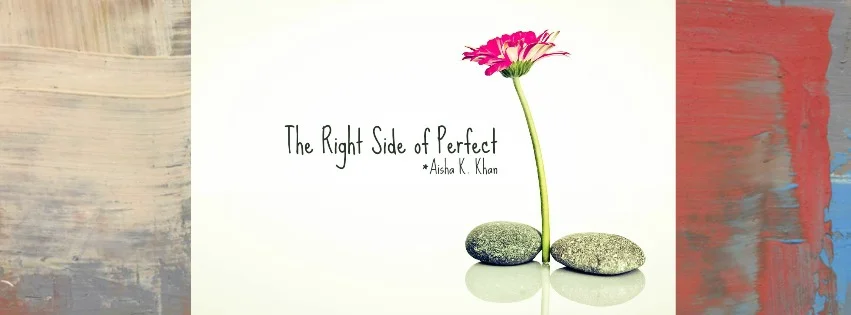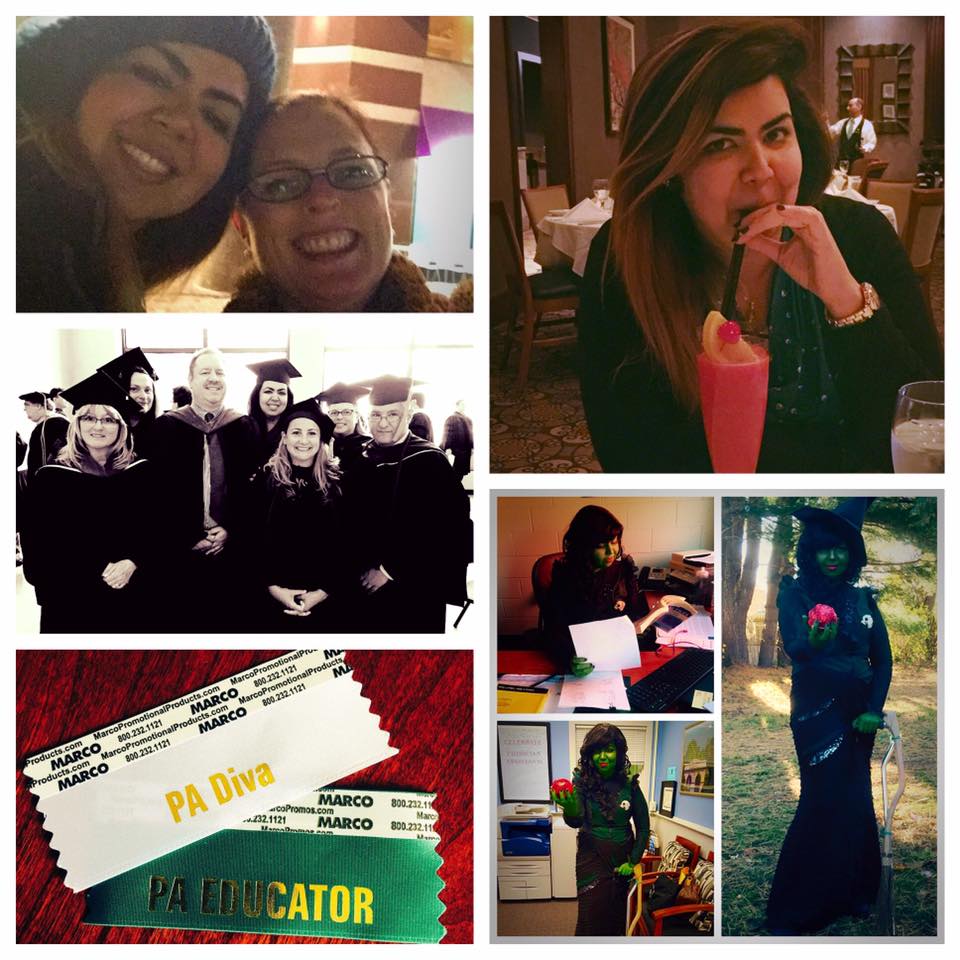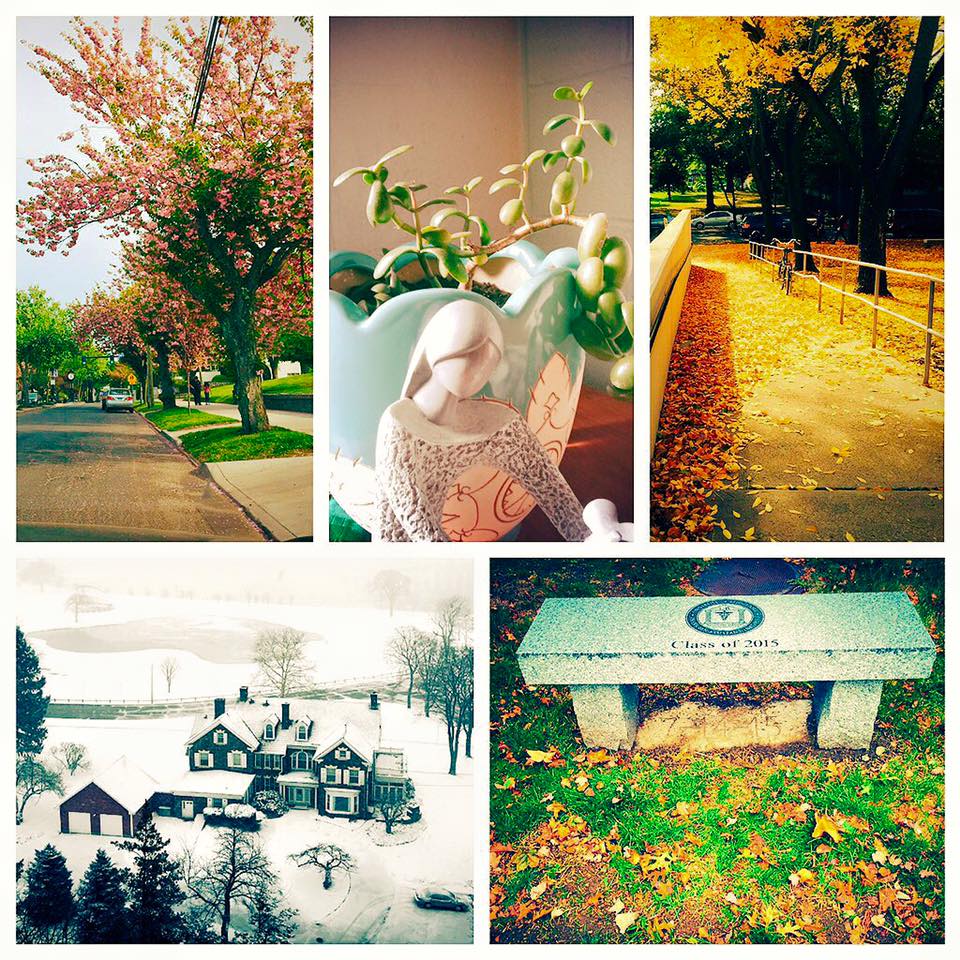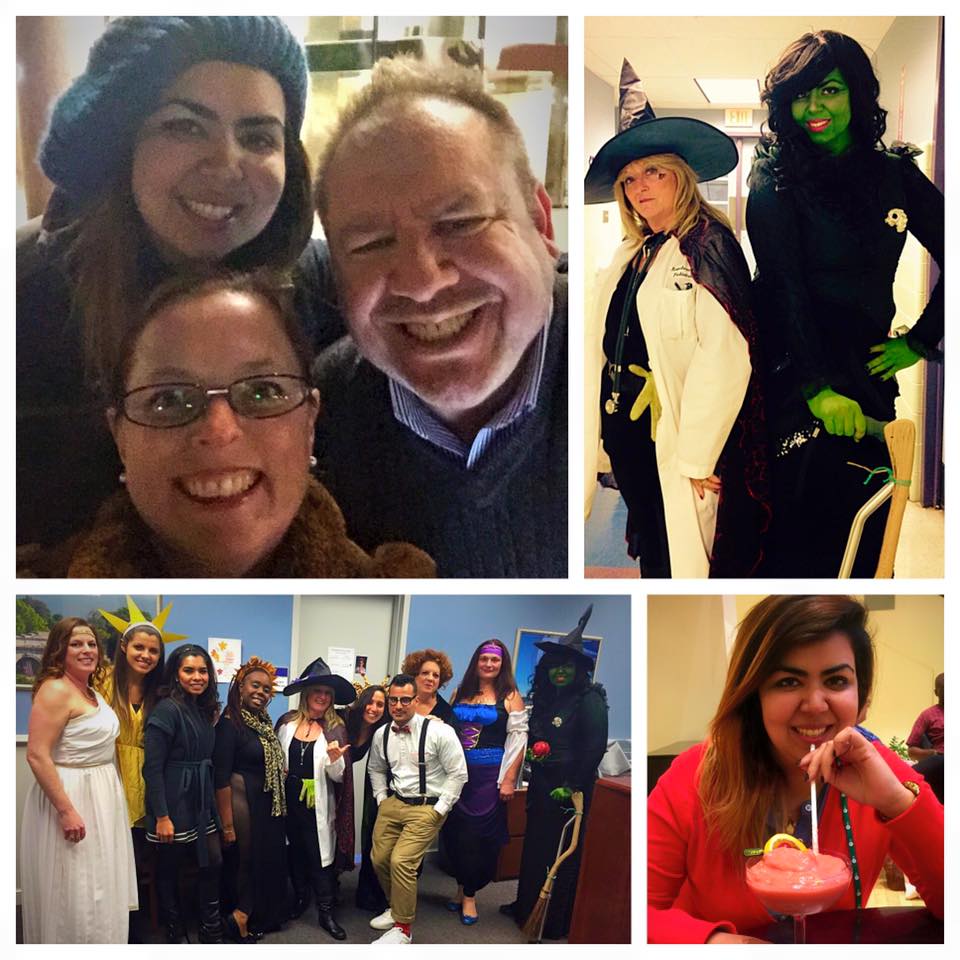Blessed to celebrate my 1 year anniversary today. Four seasons of growth, laughs, and support by an amazing group of colleagues and students. As I sit here with my colleagues enjoying tearful laughs, I think of last year and I am grateful I took the chance and applied. One of my favorite quotes my cousin shared with me, 'If your dreams do not scare you, they are not big enough.'
Paint Nite CT: First Time Around
A few months ago a friend recommended signing up for the new Paint Nite phenomenon that seems to have taken over my email and Groupon. Maybe its not such a new concept but certainly seems to be all the rave amongst most of the 30-40 something-year-olds I know. At first I was a little apprehensive about it since I would have to use my left hand (non-dominant). Naturally I assumed if writing with a pen is difficult then certainly holding a paint brush and constructing something meaningful let alone beautiful would be equally as difficult, if not more. Sadly I had a defeatist attitude and tried desperately to approach this new experience with a smile and brave front. Well, I learned that indeed I could paint with my left hand, and at that, very well. Reminds me of a quote I read many years ago, "the fear of failure holds us back".
Now instead, I'd like to remember to always be open to new things, even if you doubt yourself. Or as my friend likes to say to me, "life opens up when you do", well according to Crest. I'd have to agree.
It Takes a Village
Most have heard the saying, “It takes a village to raise a child”. While I wholeheartedly agree with this, I also feel that this applies to healthcare and needing a village to heal patients as I have directly benefited from the efforts of my “village”, or per the ABTA, my commYOUnity. It is probable that I would have had similar success as I do now with surgery and therapy alone, but the quality of my life would have significantly lacked in comparison if I did not have the emotional and personal support I had and still do. To have traveled this journey alone seems unimaginable.
It wasn’t until December of last year that I felt well enough to start exploring avenues to get involved and possibly become a mentor or “buddy”. My desire to do so was inspired by my own struggles as I found myself often frustrated with the lack of clarity surrounding my diagnosis and then with recovering from disability. I would ask what I thought to be simple or general questions only to receive the run around. Was I the first brain tumor patient these individuals have ever encountered? Am I the first disabled person asking for information on the best course to be independent again? Driving was a huge goal I wanted to accomplish and for months I sought information or assistance but found myself directed from one person to another.
In a Chicago State of Mind.
This passion also led me to the American Brain Tumor Association (ABTA) and the Connecticut Brain Tumor Alliance (CTBTA) . I was fortunate that through my efforts to advocate with ABTA, I was invited to Chicago where ABTA headquarters is located for the annual Patient and Family/Caregiver Conference at the end of July.
Member of ABTA CommYOUnity Network. A staircase full of inspiration.
At the conference, I learned about current treatment methods and innovation in the areas of neurosurgical and neuroncological medicine. I remember hearing stories of other survivors and all I kept reveling in was, “they get it”. It was at that moment that I felt my struggles and concerns were validated by this amazing group of individuals who each struggled with and continuously persevere against a diagnosis that has wreaked just a little bit of havoc in their lives. I had never met any of them before then and yet I felt like I could relate to them and that we shared this bond through our experience.
This theme of comradery and commYOUnity was also relevant in the distinguished panel of speakers at the event including Drs. Susan Chang, Mark Johnson, Erik Sulman, and Joon H. Uhm to name a few. During one of the case review panel board seminars, whilst discussing the benefit in patient care with a tumor board vs a single MD approach, Dr. Lorenzo Munoz, a neurosurgeon at Rush University Medical Center, stated “I’m a smart guy, but I’m not smarter than all of us collectively”. It was a statement which was appreciated and applauded by many attendees who have personally benefited from a collaborative approach.
Later on, I was afforded the opportunity of attending a lecture given by APRN Kathy Lupica on “Quality of Life: Managing your Symptoms & Finding Support”. It was a humorous lecture with a touching tribute to the recurring theme of community in the lives of many patients.
ABTA Patient & Caregiver panel.
Another inspiring aspect of the conference was the opportunity to hear actual patient and caregiver experiences. Two couples were asked to speak of their experience. Meet Martin & Karma who have bravely battled Martin’s Glioblastoma diagnosis and Donna VanRyn a 9 ½ year Glioblastoma survivor who credited much of her success to the love and support of her husband. They also echoed the sentiments of many gathered to hear their experience, particularly Donna, who stated she has done so well that people have a hard time registering her illness. “I look too good to be ill to others”. Overall, the conference was an amazing experience and an opportunity to meet wonderful individuals who will be partners in the continued effort to advocate for brain tumor patients and their caregivers.
CTBTA Night of Hope
Back in CT, I followed up the conference with the Connecticut Brain Tumor Alliance “Night of Hope” with attendees, friends, and fellow brain tumor survivors, including Chris and Ashley Cusano. It was an amazing evening of music, inspiration, and of course paella. We gathered and watched Morgan Platt’s rendition of “Fight Song” by Rachel Platten. We then ended the evening with inspiring words by Tracey Gamer-Fanning, President Emeritus of CTBTA. A 9yr brain cancer survivor, mother, wife, and relentless advocate whose message ensured that those present to hear her speak that night will never look at brain tumor patients the same again.
To say that I have been inspired by these two organizations, their members, and fellow volunteers is an understatement. I have recently been matched with another brain tumor patient and though she has mentioned that my random calls have brought her some joy and comfort, I make sure she knows that by allowing me to be a part of her community, she has done the same for me. So indeed, it takes a village to heal a patient.
Travel Therapy: How Traveling without an Agenda was one of the Best things I did after Brain Tumor Surgery
For as long as I could remember, I have always traveled with the intent of accomplishing something. Always with the burden of completing a list of tasks set either by myself or by another party. I never had an opportunity to travel for the sake of, well nothing. Seemed appropriate that after a year of extensive therapy and rehab since my surgery, I would have my first trip be just that, for nothing. And I can honestly say, it was the best trip I have ever taken.
How it started: Around the same time I had my surgery in May of 2014, a good friend of mine sustained a devastating injury to her back in an accident. She underwent a very risky surgical procedure from which she thankfully did well, very well. I give her my gratitude for then contacting me and two of our mutual close friends and inviting us on a trip to Florida.
The following are some things I have learned about traveling with a disability (temporary or not) and in general about the blessing of taking care of oneself. Do keep in mind, if you are recovering from surgery, then please be sure to have appropriate clearance from your physician before embarking on your journey. Always keep your provider in the loop.
Navigating the Airport
I learned quickly that if dealing with a disability, it is important to plan ahead. I was flying out of Bradley in Hartford, CT a relatively small airport when compared to JFK or Laguardia. Since this was my first time traveling after my surgery, I took into consideration the distance I would be commuting from check in to the gate and whether I would feel comfortable towing around my carryon. Given my weakness of the right arm, I knew wheeling a suitcase would not be possible so I packed a duffel bag instead. Even with this I tired quickly and I ended up checking in my luggage or relying on my friends to help. My thanks to JetBlue for not charging a fee for additional luggage (love them!).
Check-In: What to do with Adaptive Equipment
Adaptive Equipment: Leg brace and specially fitted orthotic shoes (SAS)
I was actually most apprehensive about check in, especially since I wear a leg brace, without which I have difficulty maintaining balance and walking. I was having dreams that it would be a hostile situation with a long line of people behind me while I was being reprimanded for not removing my shoes and leg brace in a timely manner to walk through a detector. Obviously that's an exaggerated dream but that's what nightmares are. What actually happened was quite the opposite. I recevied a lot of support by the airport employees and when I was next in line at check in, I was told to place my cane on the conveyor belt so that it could be taken in to be detected. I was able to keep my brace and shoes on and was then pulled to the side and a smaller hand held detector was used to scan them. After this, I was given back my cane and that was that. No impatient people behind me, no yelling or reason to have anxiety.
Boarding: Approaching "the Tunnel"
Once my ticket was confirmed, I was directed by the flight attendant to head down the jet bridge (tunnel) behind her to board the plane. For a larger airport of if I was traveling by myself I definitely would have utilized the airports handicap services. They are readily available and do not require pre-booking. The reason I say this is that the jet bridge can feel treacherous. There are portions where there are no handrails and since it’s a downward slope, those with some physical impairment could find the movement in this direction difficult. I did and relied on the support of my friends but realized for future reference I would definitely seek out assistance beforehand.
Accommodations
We stayed at a Hilton Hotel in Orlando, and the accommodations were great, although I think when you’re from the Northeast anything with palm trees is gorgeous. Since surgery, I have a list of things in my mind before making my trip (to anywhere) and these might be some you may want to consider as well: are there handicap parking spaces (I have come to rely on the wide spaces so that I can get out of the car with my leg brace without worrying about hitting another car), will the hotel bathroom tub be too difficult to get in and out of (my biggest fear with that is slipping while trying to get out), etc. Also, you might want to consider getting a hotel room equipped with handicap accessible furniture and fixtures. They also tend to be closer to the elevator. This may not seem like a big deal depending on your needs but we were at the end of a long hallway and by the end of the day when it's your third or fourth trip back, trust me, you'll be thankful for a closer room.
Taking care of oneself, and not feeling Guilty
This was by far one of the most relaxing trips I have taken and it couldn't have come at a better time. I’m not much of a sunbather or pool enthusiast beyond aquatic therapy at rehab, but that changed temporarily this weekend. I then added to this luxury by treating myself to my first pedicure/manicure since my surgery.
The remainder of the time was spent trying different local cuisines, relaxing by the hotel fire pits spread around the pools, and enjoying the company of my friends who were a tremendous source of support for me.
I found that the things which gave me anxiety proved to be nothing in the end. Sometimes we prevent ourselves from experiencing that which can bring us some peace, some happiness, and some much needed confidence only because we imagined the worst. Also, I didn't feel guilty for taking time for myself. If anything, I learned that it is important to recuperate emotionally and mentally just as much as it is to do so physically. You have to find time so that you can be your best either for you or for someone you are caring for. No matter how small or inexpensive, taking time to relax and refocus are essential, for you and those around you.
Well, until the next trip then...





